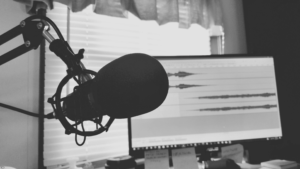 So you’re gearing up to record a live session with a voice talent! This is a great way to improve the visibility of your product or service and humanize that commercial or narration in such a way that can help you for weeks or months to come. But this can be kind of intimidating, especially if you’ve never taken on a directing role before.
So you’re gearing up to record a live session with a voice talent! This is a great way to improve the visibility of your product or service and humanize that commercial or narration in such a way that can help you for weeks or months to come. But this can be kind of intimidating, especially if you’ve never taken on a directing role before.
The first major choice you have to make is whether or not you want the talent to record in an outside studio, or at their home space. The major advantage in recording in an outside studio is an environment that you control completely–you know that the recording space is top notch, and you have an expert engineer on hand to sort out any hiccups.
The big disadvantage here is the additional cost, since you have to pay for the space and time in an external studio. If the talent is recording from home, you gain a great deal of flexibility, since the talent doesn’t have to travel, and you don’t have the additional cost, but there can be more hiccups with technology or the recording space than otherwise.
Luckily, home studios have really benefited from the huge leap into remote working over the last 2 years, and all the technologies that talents were using have become even more stable and easy to use.
Helpful Tips
Once you sort out that issue, below are ten tips to work through before you record to make sure that your experience is as smooth and effective as possible. It can be a truly rewarding journey to collaborate with a voice talent and it can only benefit you and your company in the long run.
Minimize adjectives
- When figuring out how you want a talent to voice your script, it can be easy to get a little too enthusiastic with the description words. Less is more here. For example, “Super conversational, like you’re talking to your best friend” or “Professional, Clear, Confident.” You want to use specific language, but not pile on the words until it becomes unclear for the talent, and makes it harder for the session to go smoothly. Too many words (especially if they start to conflict) make it harder to get the read you want.
Reference a demo sample
- If possible, this can be a great reference tool to find out what you want your talent to do. Talent generally have several different reads on their demos, mixing a variety of scripts and styles, and one of them might be close to or exactly what you’re looking for in your read. Referencing this can cut the explaining short and give you both a shortcut to your goal.
 Know your message and audience
Know your message and audience
- Make sure before you get started that you have a clear description of what the message and feel of the script is, and also who the target audience will be. This helps the talent align their skills and craft your perfect read, and makes it easier to dial into exactly what you need.
What’s important?
- Are there certain lines or words that you need to have stand out? Are there sentences that need to carry a specific emotion? Create this map for yourself and the talent to give them another tool to make a great read.
Read it aloud
- Many times scripts have to go through multiple revisions before being ready to record. Finalizing your script before hand is crucial to saving time in the long run. The last thing you want is to be making re-writes on the fly during a session, especially in a situation where they need to be approved by legal.
- There’s a simple, vital step that you need to take before you put the script in front of your talent. Have someone sit down and read it aloud. It won’t work if you don’t read it out loud, and here’s why: this is the fastest way to identify trouble spots in the writing. Perhaps there’s an awkward phrase, or something could be made a contraction to flow better, or anything of that nature. It will probably feel a little awkward, but the benefits all around outweigh the minor discomfort.
Audio Quality Check
- This tip specifically applies to talent recording in their home studio. It’s unfortunate, but some people choose to get a demo that does not accurately represent the work they are able to do in their home studio. Audio software in the hands of an expert producer can create a hot rod out of the proverbial lemon pretty easily. A short test recording from the talent will give you a quick and easy idea if they can deliver on the promise of their demo. This may already be covered in whatever audition they do for you, but if not, you should be able to negotiate a couple sentences to make sure no one is promising something they can’t deliver.
Be ready for your ABC’s
- Requesting ABC’s from a talent means asking them to read something three different times in three slightly different intonations. This can be very useful if you have any parts of your script you’re not totally sure about the read of, particularly the tag line. Time equals money so it’s good to get a few different reads from the talent to make sure you have more than you need just in case. Having extra makes it much less likely that if you have to switch anything around or alter a tone you have to call the talent back in and pay for an additional session fee.
Too many cooks
- In a directed session, it’s natural that many people in your company may want to listen in. It’s very easy for that type of situation to get overwhelming for everyone, and make the direction and recording far more difficult. It’s natural for different people to hear sound in quite a variety of ways, and your colleagues may have their own ideas for direction or alterations in tone. This will slow down the recording, drive the cost up, and make it harder to get the perfect recording. If you aren’t able to slim down the invite list, establishing someone at the beginning of the session as a point person who will convey directions to the talent after the group has taken time to mute and discuss changes will make everyone’s session go more smoothly and will ensure everyone feels heard.
 Get your music ready
Get your music ready
- If music is part of your final product, have it ready to play for the talent if at all possible. Music is a great way to get across the mood and tone of what you’re looking for and will help the talent dial into your needs. If you don’t have the specific piece yet, get as many descriptors as you can about genre and attitude to help set the idea and space for your talent.
Don’t forget to have fun
- This might sound silly in the business world, but it’s an important part of your session. Everyone has experienced a work environment that is a little too serious and it can be a real drain and drag for everyone. Making sure that everyone involved knows that it’s okay to be human, flub a line, or laugh at someone’s joke can help everything to go smoother. And the positive energy can make a significant difference to the overall energy and read from the talent.
Whether it’s an internal training, a telephone system, your latest commercial, or simply a scratch track, collaborating with a voice talent for a directed session can be easy and relaxed with the right preparation. You and the voice talent will hopefully be working together for years to come. Keep these ten tips in mind, and you’ll get that recording session polished off in no time flat.